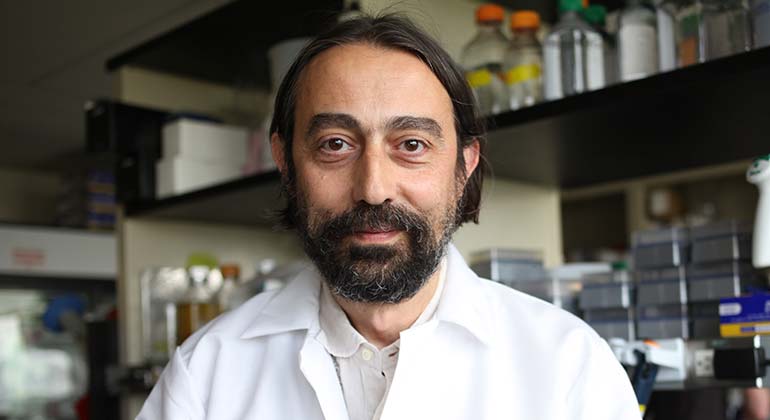Researchers Identify Flu-Fighting Pathways and Genes Essential for Influenza A Immune Defense
Findings could inform novel treatments for the flu in humans

Researchers have identified the gene TDRD7 as a key regulator against influenza A virus (IAV), which causes respiratory tract infections in 5 to 20 percent of the human population. These findings could facilitate the development of novel therapeutic interventions against influenza virus infection. The study, led by the Icahn School of Medicine at Mount Sinai in collaboration with other institutions, was published in Science Advances on October 5.
IAV is responsible for 250,000-500,000 deaths per year worldwide. When IAV infects its host, an immunological response composed of a series of molecular processes begins. IAV can infect several different species, and physiological and genetic differences among these species can contribute to different host responses, although some responses are shared.
“Identifying key defense processes and key regulators in multiple species can facilitate the development of treatments for IAV in humans,” said Bin Zhang, PhD, Director of the Center for Transformative Disease Modeling, Willard T.C. Johnson Research Professor of Neurogenetics, and Professor of Genetics and Genomic Sciences at Icahn Mount Sinai, who led the study.
The study used RNA sequencing to analyze gene expression over time in cells and tissues collected from IAV-infected humans, ferrets, and mice, identifying multiple key defense processes specific to tissues and species. One gene found to play a key role in immunological defense mechanisms against IAV across all species was TDRD7, which encodes a Tudor domain-containing protein, a type of protein shown to be involved in epigenetic regulation. In light of this discovery, the researchers conducted subsequent experiments inhibiting the function of TDRD7, resulting in an increase of virus replication in IAV-infected models.
“Identifying both common and species-specific responses to influenza is essential in developing effective therapies for the flu and can help inform future research of other respiratory infections, such as COVID-19,” said Christian Forst, PhD, Assistant Professor of Genetics and Genomic Sciences, and Microbiology, at Icahn Mount Sinai and a first author of the study.
Co-first authors on the research team also include Laura Martin-Sancho, PhD, Staff Scientist at Scripps Research, California, and Shashank Tripathi, PhD, Assistant Professor, Microbiology and Cell Biology, Centre for Infectious Disease Research, Indian Institute of Science, Bangalore.
Senior authors on the research team also include Adolfo García-Sastre, PhD, Irene and Dr. Arthur M. Fishberg Professor of Medicine and Director of the Global Health and Emerging Pathogens Institute at Icahn Mount Sinai in New York, and Elodie Ghedin, PhD, Chief of the Systems Genomics Section and Deputy Chief of the Laboratory of Parasitic Diseases at the National Institute of Allergy and Infectious Diseases, National Institutes of Health.
This study was supported by the National Institute of Allergy and Infectious Disease (NIAID) of the National Institutes of Health (NIH) under award numbers R21AI149013, U01AI111598, U19AI106754, U19AI135972, U19AI142733, and U19AI168631 and NIAID-funded Center for Research on Influenza Pathogenesis (CRIP) and Center of Excellence for Influenza Research and Response (CEIRR, contract #75N93021C00014).
About the Icahn School of Medicine at Mount Sinai
The Icahn School of Medicine at Mount Sinai is internationally renowned for its outstanding research, educational, and clinical care programs. It is the sole academic partner for the eight- member hospitals* of the Mount Sinai Health System, one of the largest academic health systems in the United States, providing care to a large and diverse patient population.
Ranked 14th nationwide in National Institutes of Health (NIH) funding and among the 99th percentile in research dollars per investigator according to the Association of American Medical Colleges, Icahn Mount Sinai has a talented, productive, and successful faculty. More than 3,000 full-time scientists, educators, and clinicians work within and across 34 academic departments and 35 multidisciplinary institutes, a structure that facilitates tremendous collaboration and synergy. Our emphasis on translational research and therapeutics is evident in such diverse areas as genomics/big data, virology, neuroscience, cardiology, geriatrics, as well as gastrointestinal and liver diseases.
Icahn Mount Sinai offers highly competitive MD, PhD, and Master’s degree programs, with current enrollment of approximately 1,300 students. It has the largest graduate medical education program in the country, with more than 2,000 clinical residents and fellows training throughout the Health System. In addition, more than 550 postdoctoral research fellows are in training within the Health System.
A culture of innovation and discovery permeates every Icahn Mount Sinai program. Mount Sinai’s technology transfer office, one of the largest in the country, partners with faculty and trainees to pursue optimal commercialization of intellectual property to ensure that Mount Sinai discoveries and innovations translate into healthcare products and services that benefit the public.
Icahn Mount Sinai’s commitment to breakthrough science and clinical care is enhanced by academic affiliations that supplement and complement the School’s programs.
Through the Mount Sinai Innovation Partners (MSIP), the Health System facilitates the real-world application and commercialization of medical breakthroughs made at Mount Sinai. Additionally, MSIP develops research partnerships with industry leaders such as Merck & Co., AstraZeneca, Novo Nordisk, and others.
The Icahn School of Medicine at Mount Sinai is located in New York City on the border between the Upper East Side and East Harlem, and classroom teaching takes place on a campus facing Central Park. Icahn Mount Sinai’s location offers many opportunities to interact with and care for diverse communities. Learning extends well beyond the borders of our physical campus, to the eight hospitals of the Mount Sinai Health System, our academic affiliates, and globally.
* Mount Sinai Health System member hospitals: The Mount Sinai Hospital; Mount Sinai Beth Israel; Mount Sinai Brooklyn; Mount Sinai Morningside; Mount Sinai Queens; Mount Sinai South Nassau; Mount Sinai West; and New York Eye and Ear Infirmary of Mount Sinai.
About the Mount Sinai Health System
Mount Sinai Health System is one of the largest academic medical systems in the New York metro area, with 48,000 employees working across seven hospitals, more than 400 outpatient practices, more than 600 research and clinical labs, a school of nursing, and a leading school of medicine and graduate education. Mount Sinai advances health for all people, everywhere, by taking on the most complex health care challenges of our time—discovering and applying new scientific learning and knowledge; developing safer, more effective treatments; educating the next generation of medical leaders and innovators; and supporting local communities by delivering high-quality care to all who need it.
Through the integration of its hospitals, labs, and schools, Mount Sinai offers comprehensive health care solutions from birth through geriatrics, leveraging innovative approaches such as artificial intelligence and informatics while keeping patients’ medical and emotional needs at the center of all treatment. The Health System includes approximately 9,000 primary and specialty care physicians and 11 free-standing joint-venture centers throughout the five boroughs of New York City, Westchester, Long Island, and Florida. Hospitals within the System are consistently ranked by Newsweek’s® “The World’s Best Smart Hospitals, Best in State Hospitals, World Best Hospitals and Best Specialty Hospitals” and by U.S. News & World Report's® “Best Hospitals” and “Best Children’s Hospitals.” The Mount Sinai Hospital is on the U.S. News & World Report® “Best Hospitals” Honor Roll for 2024-2025.
For more information, visit https://www.mountsinai.org or find Mount Sinai on Facebook, Instagram, LinkedIn, X, and YouTube.
